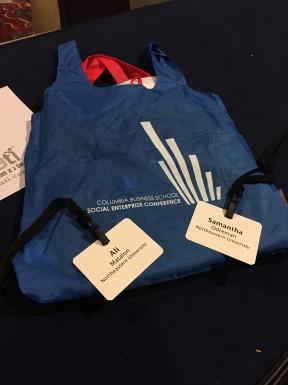 “Millennials Rising” sits as the subheading to “2014 Columbia Social Enterprise Conference” on large signs scattered throughout the Marriott Marquis hotel in Times Square. Large round tables are set up in the ballroom, each with a sign for education, social enterprise, health, food and sustainability, and environment. I scramble to find the perfect table: lightly populated, mid centre, with the appropriate signage. I watch as others scramble to do the same. We are all here for a reason. The vast majority of us are millennials and we are indeed rising. The idea that being successful and being socially conscious are mutually exclusive is becoming deteriorated as quickly as the deforestation of the Amazonian region. Naysayers call on Wall Street for reinforcement. As Erika Karp, Founder and CEO of Cornerstone Capital Inc., takes the mic to begin the breakout session “How are ESG strategies driving a sustainable future?” she questions; why call it sustainable practices and not just practices? Karp’s deep- rooted belief in the shifting mind-set of businessmen and women across countless industries provides us with hope that Wall Street will make a name for itself in our line of work: business for the global good.
“Millennials Rising” sits as the subheading to “2014 Columbia Social Enterprise Conference” on large signs scattered throughout the Marriott Marquis hotel in Times Square. Large round tables are set up in the ballroom, each with a sign for education, social enterprise, health, food and sustainability, and environment. I scramble to find the perfect table: lightly populated, mid centre, with the appropriate signage. I watch as others scramble to do the same. We are all here for a reason. The vast majority of us are millennials and we are indeed rising. The idea that being successful and being socially conscious are mutually exclusive is becoming deteriorated as quickly as the deforestation of the Amazonian region. Naysayers call on Wall Street for reinforcement. As Erika Karp, Founder and CEO of Cornerstone Capital Inc., takes the mic to begin the breakout session “How are ESG strategies driving a sustainable future?” she questions; why call it sustainable practices and not just practices? Karp’s deep- rooted belief in the shifting mind-set of businessmen and women across countless industries provides us with hope that Wall Street will make a name for itself in our line of work: business for the global good.
“It is not an extra- financial metric, it is a financial metric” Eve Ellis, senior partner for The Matterhorn Group at Morgan Stanley, insists. Ellis is the manager for two investment portfolios for investors seeking to gain a social, as well as, fiscal return. Ellis explained that the decision to explore sustainable companies for investment was not really a choice but an obvious next step given: our increasingly globalized and unequal world, and of course, investor demand. Demand here, is key. “Our power is in our pocket book” adds Mark Sloss, Senior Portfolio Manager for UBS Investment Management. Ellis and her team seek out companies with three or more women on their Board of Directors, with practices that are profitable, socially conscious and environmentally sustainable. The group has already uncovered that companies with more than two female board members are more profitable than those without. Inclusion of varied perspectives and humane business practices is becoming the corner-stone (no pun intended), of modern global commerce.
Are we at the tipping point? How will we know? Is the vernacular mainstream enough that we can now stop using it every chance we get? These questions haunt me as the positivity of the conference intensifies. The thought leaders uncover their research and show the exponential increases in interest for sustainable practices on the part of oil companies, ethical sourcing on the part of large- scale manufacturers and of course, the driver of all: investor interest in all of the above. Throughout, I fear complacency. My knee- jerk reaction to the questions above would be “no, absolutely not.” But, maybe, just maybe, we are getting closer. We no longer experience challenges that can be attacked in a traditional, singular way. The challenges of our time must be attacked from multiple angles with varying degrees of strength.
Will we stop now, or will the optimism fuel our continued progression? Personally, I believe in the latter.


